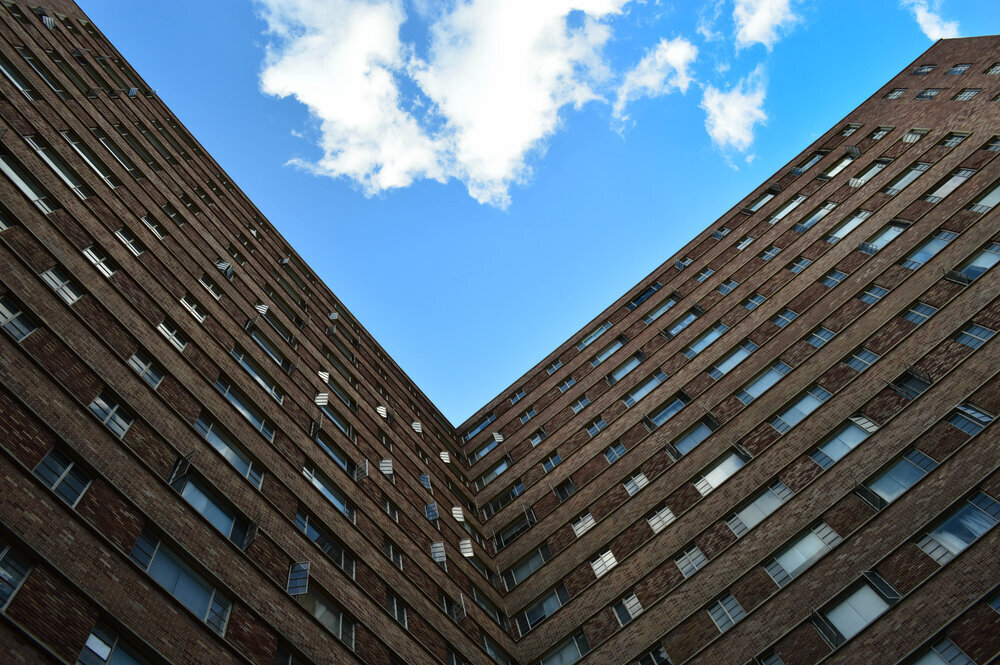Rent Control
Image: “Darlington Sky” by Johnnie Ray Kornegay III (2013)
In August of 2018, the new owners of the Darlington Apartments in Buckhead delivered 60-day notices to each of the building’s 612 units, stating residents would have to move out of their homes or else face eviction proceedings. These notices initiated the beginning of a mass eviction that put many people into a state of panic, with lasting repercussions that affected the entire Buckhead community. Many of the residents experienced a forced disconnection from the vital social networks and support systems they depended on that were now geographically out of reach. Accordingly, the ripple effects would extend themselves to those residents’ families and the wider, and increasingly more expensive, Buckhead community left behind. The Darlington was one of the last affordable housing options in Buckhead, with rents starting at $641 for a studio apartment, and was home to many seniors, veterans, people of color, and those struggling with health issues. For many of them last summer, that came to a brutal, preventable, and unnecessary end.
As an organizer with Housing Justice League, I went out to the property a number of times throughout August and September to meet with residents and try to organize with them to bring in better assistance in the face of a desperate situation. The most viscerally disturbing thing was the conditions residents were being forced to live in as many of them struggled to maintain full-time jobs, take care of children, and search for a place to go where they could afford rent and retain their job. Around the same time of the notices, the air conditioning in the 13-story building stopped working, and vulnerable residents were left in the stifling summer heat as they tried to figure out what to do. The Darlington owners had started demolishing the building from the inside, knocking down walls, likely spreading contaminants through the air, and compromising the building’s structural integrity. At least one resident’s ceiling collapsed. Other egregious issues included the loss of hot water and a broken freight elevator, which made it nearly impossible to move large items out of the building, especially for individuals with mobility issues. In desperation, many residents threw their belongings out of the windows to the parking lots below.
The case of the Darlington mass eviction makes plain the lack of tenant protections in the state of GA and how this facilitates the use of housing first and foremost as a tool for profit, rather than for meeting a basic human need. The year before the 60-day notices were sent out, the Darlington had shifted ownership in a purchase by Varden Capital Properties, whose core business model is based on property flipping. VCP’s owner, Trace McCreary, left Wall Street after the financial crisis to get into the business of acquiring and flipping rental properties, now higher in demand due to the foreclosure crisis he helped create. VCP’s website states plainly, VCP “was founded in 2011 with the objective of acquiring undervalued real estate, repositioning the asset, and creating positive returns for its investors.” When VCP purchased the Darlington, its residents did not realize the implications of the shift in ownership. Many residents were under the impression that they would be able to stay, having heard from the new owners at the time of the sale that the decades-overdue renovations would be made for their benefit.
VCP’s true intentions, however, are indicated in their decision to stop renewing leases, transferring most residents to month-to-month tenancy. Under Georgia’s landlord-tenant law, this was all VCP had to do to terminate the tenancies of all 612 units with just 60 days’ notice. In Georgia, tenants have no right to renew their lease. Besides enabling property flipping, a lack of this legal protection (known as “Just Cause”) makes tenant enforcement of quality living conditions very difficult. Tenants know that repair requests could likely cause a landlord to refuse a lease renewal and seek a less bothersome tenant.
Faced with an increased corporate monopoly and speculation on rental housing, ever-rising rents (between 2001 and 2015 there was a 50 percent increase in median rent), and stagnant wages, tenants are taking action and getting results. In an increasing number of cities and states across the US, tenant groups are winning the combination of strong Just Cause eviction protections and rent control. This combination of protections significantly increases a tenant’s stability, giving them the right to renew their lease (except in cases of lease violations) and limiting the amount landlords can increase rents each year, while still allowing for a “fair return on investment” for landlords. Enactment of robust rent control (without too many loopholes) in Atlanta would make VCP’s business model much less feasible.
In Atlanta, where five percent of low-income housing was lost every year between 2012 and 2016, and where only 25 percent of low-income families have access to affordable housing, rent control is desperately needed. Rent control is the public policy that can be implemented with the most immediate and wide-ranging impact. For example, the number of homes made affordable by rent control in San Francisco is three times the number of affordable units provided through all other affordable rental housing programs combined. Most other affordable housing policies are based on subsidizing affordable housing providers with public tax dollars and thus require high levels of funding. These kinds of programs are also grossly inadequate to meet the need, with only one in four families in the US who qualify for rental assistance receiving it. Rent control, on the other hand, can be implemented with limited funding and still have an enormous impact. In our current climate of urban austerity, rent control’s limited funding requirements make it feasible in the immediate future.
In response to increased tenant organizing for rent control, the real estate industry and conservative economists are launching marketing campaigns to instill fear of “market inefficiency” among the public and convince us that rent control will only make a bad situation worse. Similar to arguments against raising the minimum wage, this is simply a response of the billionaire class to fear of growing popularity around policies that could threaten their profit margins and make a difference for poor and working people. Rent control might seem like an impossibility in Georgia where state legislature bans the regulation of rents. However, momentum-building initiatives like the Lift the Ban Coalition in Detroit can help us see that many people affected by the issues won’t stand for continued rent control bans. When organized together, tenants and workers (who build the wealth of the elite class) can be an unstoppable force to win power back from speculators that displace valuable communities like the Darlington residents.


